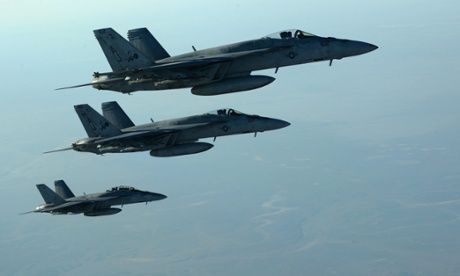Analysts say west's action in Middle East could lead jihadists to stay in Britain rather than travel abroad

Air strikes on 24 September against Islamic State targets in Syria hit oil refineries that the US says provide a revenue stream for the militants. Photograph: US Air Force/Shawn Nickel/EPA
Hundreds of Islamic State (Isis) sympathisers in the UK could delay or halt plans to travel to Syria and Iraq and instead choose to launch attacks on home soil in direct response to the decision to begin air strikes in the Middle East, experts have warned.
Analysts from the International Centre for the Study of Radicalisation and Political Violence said they had identified a cohort of Isis supporters numbering several hundred, whom they classified as "fanboys", and who they believe might now stay in the UK rather than fight abroad.
Professor Peter Neumann, director of the centre, based at King's College London, said the MPs' vote for air strikes in Iraq had, in the minds of some Isis supporters, moved the frontline from Syria and Iraq to Britain.
Meanwhile, David Cameron has been accused of refusing to engage with Britain's Muslim community in the runup to Friday's vote on air strikes. The Muslim Council of Britain (MCB) said the snub would intensify disaffection among young Muslims. The Observer has learned that officials took soundings from several thinktanks including the Quilliam Foundation, which challenges extremism.
Harun Khan, deputy secretary-general of the MCB, the UK's largest Muslim organisation, also warned that non-engagement on such an issue further undermined Prevent, the government's key counterterrorism strategy that is aimed at engaging communities, but has been accused of alienating young Muslims and pushing them towards radical groups.
"We go to the mosques, to events, and we say to young guys to participate in politics, but they say: 'Actually, the government doesn't want to listen to us.' We're grassroots, in touch with our organisations. Whatever we do is based around the consensus view of what's happening on the ground. You need to have constructive dialogue."
Neumann said that, despite the focus on the threat posed by returnees, a cohort of British-based Isis sympathisers who might not travel abroad were also of concern.
"We call them fanboys, they enthusiastically use open forums and Twitter, clearly they are very radicalised, very extreme. They are maybe talking about going to Syria but they haven't done it yet. There are several hundred people in this country who are actors, supporters of the Islamic State online, who are disseminating material, supporting the cause, saying very offensive things."
He said the internal dynamics of the Syrian civil war were less exciting to many potential British jihadists than a conflict between Isis and the west. "Now that [air strikes] are happening, you can see people are more turned on by the west versus Islam conflict, more excited than when the west was a passive participant," he said.
The MCB said that, although polls showed widespread public support for air strikes, these sentiments were not shared by British Muslims.
Khan said: "Last night a spokesperson for MCB was chairing an event with about 500 Muslims. They did a straw poll with the audience there and then. They put it to the people: how many would be in favour of air strikes? Three people put their hands up. The bombing itself will only create more hatred, ultimately there will be civilian casualties as well. It will feed into the narrative of Isis."
On the security front, Neumann said the latest intervention in Iraq would pose new logistical challenges for intelligence agencies. "The problem is that you are dealing with several hundred people. It becomes a capacity problem," he said. "One cannot follow that many people day and night. The problem is that if you do a relatively low-cost operation, take a big knife and behead someone on the spur of the moment, it's very difficult to stop."
Sources say they have no intelligence that a specific terrorist attack is planned against the UK, but fear persists that the most likely form of attack will be low-tech and unsophisticated.

0 comments:
Post a Comment